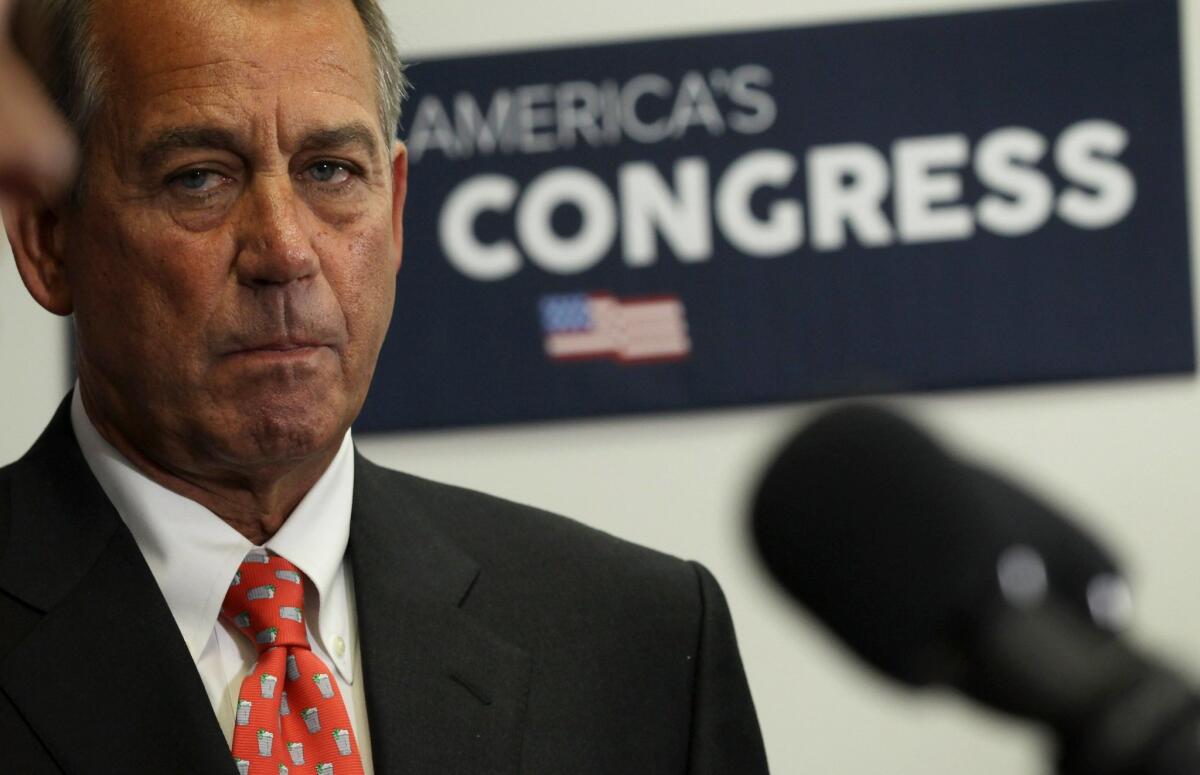If you’re happy but don’t show it, you’re conservative

- Share via
Conservatives tend to say they’re more satisfied with life than do liberals, but when they open their mouths, it’s liberals who seem to show more happiness, a new study suggests.
A handful of studies of late have shown that conservatives tend to report greater satisfaction in life than their liberal counterparts. Social scientists have suggested that this could be because the cultural, personal and religious beliefs of conservatives are simply more adaptive. Others suggest those values serve as palliative psychological armor to rationalize the social inequities that tend to trouble liberals.
But a study looking at the words and expressions of members of Congress, published online Thursday in the journal Science, tested this apparent “ideological happiness gap” against smiling behavior and the use of positive and negative words. It found that liberals smile more, their smiles tend to show more genuine enjoyment, and they use more positive language than their conservative counterparts.
So what gives? Are conservatives hiding an inner grumpiness? Are liberals out of touch with their inner happiness?
Here’s what researchers think is going on, and it could have implications on the way social science is conducted and public policy is evaluated.
The ideological happiness gap that has received so much attention is largely based on self-reporting. UC Irvine social psychologist Sean Wojcik, the lead author of the study, suspected there could be a difference in the way conservatives and liberals filled out psychological questionnaires used to gauge life satisfaction and happiness.
“Conservatives tend to have what we call more of a self-enhancing style of self-report, which involves a more flattering way of evaluating the self,” Wojcik said.
Previous studies have shown that such self-enhancement is more common among individualists, in Western cultures, among those who believe more strongly in hierarchies, and among the religious, all of which are traits common to U.S. conservatives.
Researchers used YourMorals.org, a psychological research website, and it basically duplicated what other studies have found - conservatives report higher rates of happiness. But it also showed that “self-deceptive enhancement” was higher among conservatives than among liberals, and in fact was mediating the association between ideology and life satisfaction.
They next turned to the 113th Congress, a two-year session that just ended in January. Where else, they figured, is the liberal-conservative divide more apparent? The voting record of members provides an easy measure of their ideology. The Congressional Record records their words, and the Congressional Pictorial Directory captures their facial expressions.
Greater conservatism, measured by voting record, was associated with a significant decrease in words with a positive affect, the study found. The same proved true when party lines were used instead of voting record.
Suspecting that perhaps the 113th Congress was somehow different, researchers examined 432 million words uttered over 18 years in Congress, and found Democrats used a higher ratio of positive to negative words than their Republican counterparts.
Next they looked at photos. Scientists have long known that a certain type of grin, called a Duchenne smile, indicates genuine happiness and amusement - it engages muscles around the eyes, not just the edges of the lips.
Conservatism predicted significantly less frequency of Duchenne smiling, they found. Liberals were far more likely to smile in the more intensive manner.
Although we may call one part of Congress the House of Representatives, members might not be so representative of the population when it comes to emotion, the authors noted.
So, Wojcik and his fellow researchers from USC and the University of Illinois’ Chicago campus looked at language and emoticon use in Twitter status updates from members of groups known to be either liberal or conservative. The same pattern emerged, the study found.
It’s possible Republicans are so peeved at having Obama in the White House that they just don’t smile much or speak positively in public, and have staked their strategy on negativity.
“If conservatives are expected to be less happy when Obama is president, we would also expect to see that they are less happy in self reports,” Wojcik said. “But that’s not what we see.”
Before conservatives walk away frowning and grumbling, and liberals grin, though, there are some important points to consider, Wojcik said.
“It doesn’t mean that liberals are happier, or that conservatives are less happy or vice versa,” Wojcik said. “It just kind of means that it depends on how you measure it.”
So, if public policy is to be judged by levels of satisfaction, Wojcik said, researchers should be careful what measure they use.
“It kind of raises this philosophical question of what it actually means to be happy,” he said. “I think the best answer for researchers and potentially for policy implications, is to seek converging results across all these different kinds of measures.”
Mad? Smiling? Either way, follow me on Twitter: @LATsciguy







